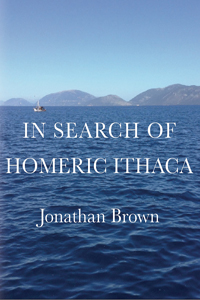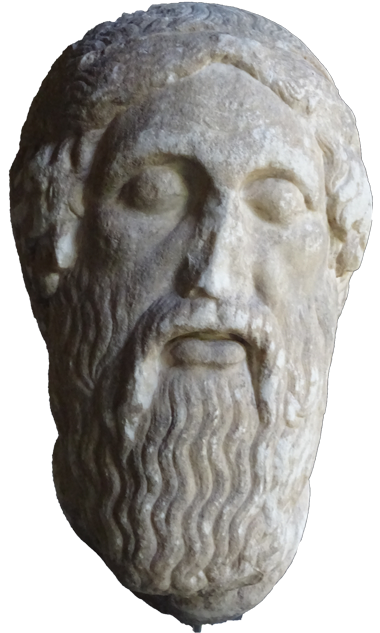In search of Homeric Ithaca
Jonathan Brown
435 pp. • hardback • ISBN 9780648092520 • $45
270 illustrations. 35 maps. Satellite imagery. List of ancient writers. Bibliography. Select websites. Index.
Published by Parrot Press
on 23 August 2020

About the book
Odysseus was notoriously vague about where he lived. Ithaca was the place, he said, but his description of its whereabouts was a mixture of geography and poetry. Tradition says that it was the modern island of Ithaki in the Ionian Sea. Other theories, however, have placed it elsewhere.
This book takes a close look at the traditional view, and at some of the other theories.
The author examines the Odyssey in detail, draws on ancient and modern scholarly texts (some translated into English for the first time), reproduces antique and contemporary maps, and satellite imagery, quotes from the accounts of earlier travellers and topographers, sails the Ionian Sea, and above all, walks the landscape of Ithaki exploring the extent to which the island matches the Ithaca of the poem.
The result is a treasure trove of documentation and discovery.
The author proposes new explanations for some age-old problems: where was Dulichium? Where did Telemachus land in Ithaca? Where was the city? Where was the palace of Odysseus? He suggests localities for them all.
His analytical approach is informed by wide research into historical, literary and archaeological sources, and is abundantly illustrated. For the first time, several Ithacan landmarks that conform closely to the words and action of the Odyssey are identified.
The author then travels to Cephalonia, Lefkada, Corfu, Sicily, Spain, Denmark, and the Azores to explore other proposed localities for Ithaca. He returns to Ithaki, and reflects on how Homer could have known the island that so closely matches the island of his poem.
An ideal companion for lovers of Homer and travellers alike.
About the author
Jonathan Brown studied Latin and ancient history at the Australian National University in Canberra. He is a former Australian diplomat and international lawyer, and author of several books on the music of Richard Wagner. His Great Wagner Conductors: a listener’s companion (2012) received an Association for Recorded Sound Collections (ARSC) Award for Excellence in 2013. His most recent book Homeric sites around Troy was published in 2017.
From the reviews
"Beautifully researched and written and includes some terrific maps and stunning photographs." Humanities 21, Melbourne, Newsletter, January 2021.
Review by George Paxinos (Kalatzis), author of Passage to Ithaca (Melb 2012) and The Ithacans, Melbourne 1916 - 2016 (Melb 2016):
Over a span of about a hundred and fifty years works concerning the search for the Ithaka of the Odyssey have been both numerous and diverse. Many readers will have a passing acquaintance with the likes of Schleimann, Dorpfeld, Berard, Bittlestone and the archaeological works of Heurtley, Benton and Symeonoglou. However, it is doubtful if any of the above established first hand experience of all the relevant sites to the extent that Jonathan Brown has done. Where many scholars rely on the findings of other scholars, often regurgitated without re evaluation, Brown has gone to extreme lengths to put all the previous theories to the test of first hand observation. If you are like me, ever the tourist on such a topic but open to further enlightenment, then this acutely and exhaustively examined labour will be of interest. On the other hand the classics aficionado too will find abundant scholarly fuel for the soul. And the scholarly insights never get in the way of readability. The writing is lively and easy, without compromising on detail.
The present day Ithaki upon which Brown re-enacts the Odyssean return is rendered with such verisimilitude that the reader has the sense of witnessing the action of the poem in real life terms. The intimate descriptions of every nook and cranny on Ithaki are convincing because they are based on acutely-observed firsthand experience. He has not only visited the sites of interest numerous times but at different seasons and at different times of day to better gauge the effects of light, temperature and wind in so far as they impact on the poem’s relationship with the terrain. The narrative flows effortlessly between the two worlds, reserving the term Ithaka for the Homeric, and Ithaki for the island as we know it. If you have been waiting for a rebuttal to Bittlestone’s interesting, but ultimately bloated, anti-Ithaki proposition in Odysseus Unbound (2005), In Search of Homeric Ithaca does the task with unwavering exactitude.
We never get the sense that Brown tries to make the island fit some preconceived idea. His ideas remain fluid until they are virtually irrefutable. His questioning has taken him on multiple sea journeys around the archipelago with the island of Ithaca the epicentre of interest. He has traversed all the tracks from the length and breadth of the island and published copious photographs to illustrate his thesis. Geographical features that do not meet his expectations are not conveniently omitted; he adapts, tries another angle drawing reader into the search in the process. Not content with visiting all the relevant sites on Ithaca, Brown also put competing theories to the test by visiting the sites central to those theories. The vivid photographs and maps, old and new, not only keep us close to the action but facilitate our vicarious participation in the numerous investigative excursions undertaken. His enthusiastic reassessments of the topography in the context of the poem never feel contrived, and create the impression that it is the island itself declaring its Homeric pedigree without undue prompting.
This work should be deemed an essential balm to those who suffer from the incurable disease of Thiakolatria. Having read the book I can no longer claim relative ignorance of the topic. I would go so far as to say if you only ever read one serious work on the subject this must be it, because through it the reader will be informed of all other theories and see their Homeric geography credentials reasonably compared. Seeing Ithaki through Brown’s astute vision and reasoned argument, we come away with an enhanced understanding of the island that few of us know as well as the author.
from ΟΔΥΣΣΕΥΣ, a publication of the Ithacan Philanthropic Society (Melbourne), Issue 3 - 2020, page 5.
Get the book
Available for $45 from the Ithacan Historical Society in Melbourne, Victoria, Australia.
Ebook (pdf of the print version) available for $16.50 from Google Play. Read the first 80 pages, including the table of contents, list of maps, introduction, several maps and illustrations, in the Free Sample.
